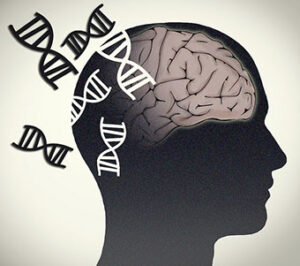 Originally by Rebecca Wang, MS, CGC in 2021; Updated by Scott M. Weissman, MS, CGC in 2024
Originally by Rebecca Wang, MS, CGC in 2021; Updated by Scott M. Weissman, MS, CGC in 2024
November is both National Alzheimer’s Disease Awareness and National Family Caregivers Month, making this a fitting time to discuss the genetics of a disease that touches many people – directly and indirectly. Alzheimer’s disease is a progressive, neurological disease and is the most common cause of dementia in elderly adults. People who have Alzheimer’s disease suffer from profound memory loss and cognitive decline, often losing the ability to perform daily tasks on their own. It is natural for people to worry about their risk of developing Alzheimer’s, especially if they have seen people in their lives suffer from this debilitating illness. But think twice before getting genetic testing for Alzheimer’s: it is only one small piece of the puzzle.
Before I can tell you why to proceed with caution, let me give a brief overview of Alzheimer’s genetics. In short, research on Alzheimer’s genetics has made significant progress in recent years, yet there is still a lot we do not understand about the heritability of the disease.
About 5% of Alzheimer’s disease is classified as early-onset, meaning it is diagnosed before age 60. There are three genes – APP, PSEN1, and PSEN2 – that are known to cause early-onset Alzheimer’s disease. Clinical testing for these genes is available for individuals with a relevant family history. There are also cases of early-onset Alzheimer’s where individuals do not have a genetic mutation that is thought to cause their illness.
The majority of Alzheimer’s is late-onset (diagnosed after age 60) with age as the biggest risk factor. There is one gene that has been identified as a susceptibility gene for late-onset Alzheimer’s disease: the APOE gene. Every person has two copies of the APOE gene, but there are different variants, or forms, of this gene. One variant, known as “e4”, is linked to late-onset Alzheimer’s. Studies have shown that individuals with one copy of e4 have an increased risk for Alzheimer’s disease, and individuals with two copies have an even higher risk. For years it was believed that the APOE gene was a risk factor for late–onset Alzheimer’s disease, but not a causative gene. However, a scientific study published earlier in 2024 has now raised the possibility that individuals who have 2 copies of the e4 version of APOE face a high risk of developing Alzheimer’s disease that may be similar to the other three genes, just with later onset.
Because there is no treatment or prevention for Alzheimer’s disease, there is no clinical action to take if someone has an e4 variant. However, knowing may open the door to clinical trials. APOE testing is currently not clinically recommended as a test to predict the likelihood of Alzheimer’s in people without symptoms. The American College of Medical Genetics and the National Society of Genetic Counselors both advise against APOE testing, due to its limited clinical utility and low predictive ability. While this testing can offer people an answer about one small piece of their genetics, it is ultimately not a complete picture of their health risks. There are many other factors, such as environment and family history, that influence whether a person will develop Alzheimer’s disease.
If you are concerned about inheriting Alzheimer’s, or any other disease, a genetic counselor can help you understand your risk and your testing options. Genetic counselors are also trained to help individuals anticipate the potential psychological implications of testing for a late-onset disease they have no control over, making them a crucial part of testing for incurable diseases like Alzheimer’s. To locate a genetic counselor near you, you can use the National Society of Genetic Counselor’s Find a Genetic Counselor tool. To learn more about Alzheimer’s disease, visit the Alzheimer Association.
Photo credit: National Human Genome Research Institute
References
[1] Bekris LM, Yu C-E, Bird TD, Tsuang DW. Genetics of Alzheimer Disease. Journal of geriatric psychiatry and neurology. 2010;23(4):213-227. doi:10.1177/0891988710383571.
[2] Goldman JS, Hahn SE, Catania JW, et al. Genetic counseling and testing for Alzheimer disease: Joint practice guidelines of the American College of Medical Genetics and the National Society of Genetic Counselors. Genetics in Medicine. 2011;13(6):597-605. doi:10.1097/GIM.0b013e31821d69b8.
Related Posts


